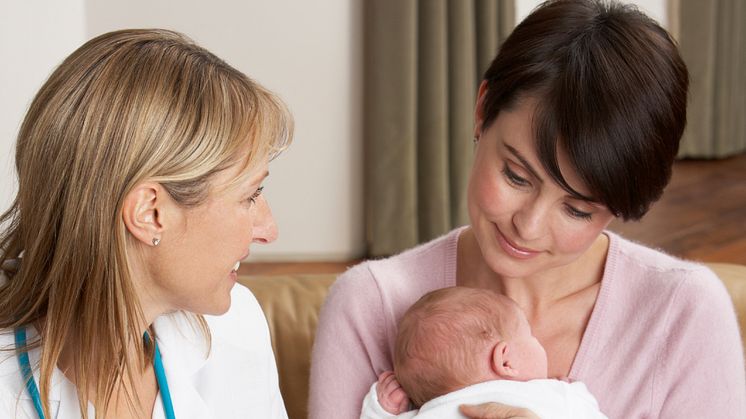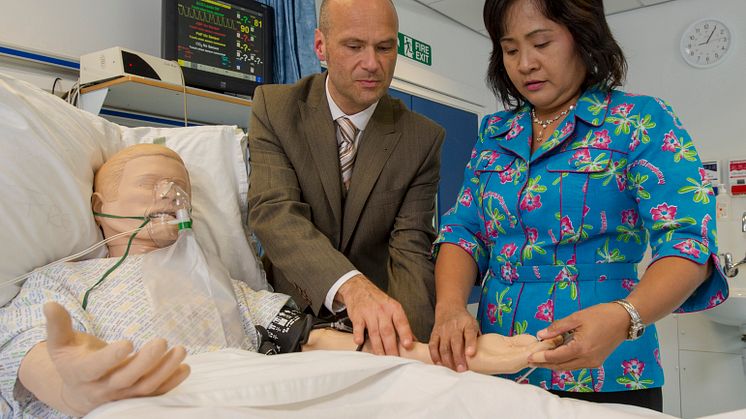
Press release -
Experts gather as infant mental health comes under the spotlight
Almost 200 specialists from across the region have gathered at Northumbria University to find out about the support it can offer practitioners on issues surrounding infant mental health.
The UK’s first Infant Mental Health Awareness week is being held between Monday 6 and Friday 10 June to raise a greater understanding as to how a child develops socially and emotionally from pregnancy throughout its early years to ensure that every baby is given the best possible start in life.
The week is organised by the charity Parent Infant Partnership and aims to show how parents, professionals and policy makers can better understand infant mental health, early childhood development and healthy early relationships to lay the foundation for good mental health.
Northumbria University is a leader in the field of developing and supporting professionals working with infants, small children and their families and used Infant Mental Health Awareness Week to launch a new series of continuing professional development courses for people working in the early years services, such as midwives, health visitors, social workers, Sure Start workers, teachers and therapists.
Northumbria academics have specific expertise in the area of parent/infant observation and providing psychological interventions for children and young people and the CPD courses use psychoanalytic theory to give practitioners an insight into unconscious processes that may be hindering development and can be used to help build parent-infant relationships.
Dr Deborah James, a Reader in Child and Family Communication in Northumbria University’s Department of Social Work and Communities, explained: “From the earliest days of psychoanalysis, observation and therapeutic work with infants, children and parents has generated a body of knowledge and understanding about early emotional, social and intellectual development in relation to the environment they are exposed to.
“Psychoanalytic thinking helps people working with infants, young children and families to be able to stand back from situations which are often emotionally charged and stressful, to see and work without being overwhelmed.
“Here at Northumbria we can offer practitioners an excellent insight into how they can use this theory throughout the course of their work. We have specific expertise in areas including parent/infant observation and pre-clinical training required to be a psychotherapist and can offer short training courses to support practitioner development. These courses look at how a child develops a body and mind of its own through its interactions with its caregivers, and how practitioners can use specialist video interaction guidance to capture and feedback on interaction within families.
“We were delighted to welcome so many specialists and practitioners to the University for this event and to launch our new range of short courses aimed at further developing the skills of those working in this sector.”
The training is being offered by Northumbria University’s Departments of Social Work and Communities and Public Health and Wellbeing, which offer courses covering social work, community studies, family therapy, early years teaching, mental health professional practice and the management of children’s services. Many teaching staff have extensive experience of working in local authorities, health trusts and voluntary sector organisations before moving into teaching.
The departments undertake extensive research which aims to make a positive difference in the lives of disadvantaged individuals, groups and communities. A major research priority is the area of children, families and communities is particularly renowned, with specialist expertise in child and family communication, family justice, child development and safeguarding children. Over half of the research emerging from this area was rated as being ‘world leading’ or ‘internationally excellent’ in the 2014 Research Excellence Framework which assesses the quality of research being undertaken in UK universities.
For more information on the short courses, visit www.northumbria.ac.uk/specialistcpd
Topics
Categories
Northumbria is a research-rich, business-focused, professional university with a global reputation for academic excellence. To find out more about our courses go to www.northumbria.ac.uk
If you have a media enquiry please contact our Media and Communications team at media.communications@northumbria.ac.uk or call 0191 227 4571.









